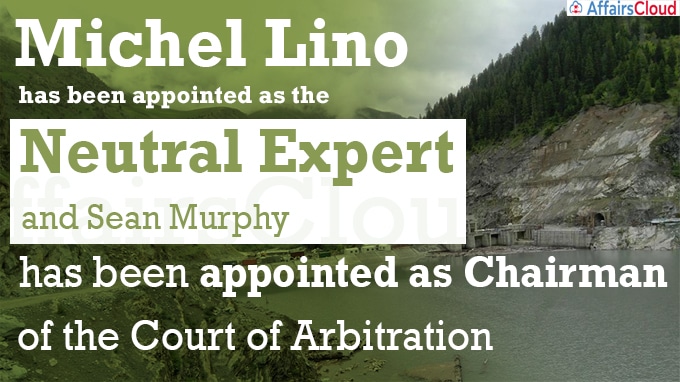 The World Bank (WB) has appointed a chairman of the Court of Arbitration (CoA) and a neutral expert as mandated in 2 separate processes requested by India and Pakistan in relation to the Kishenganga and Ratle hydroelectric power plants.
The World Bank (WB) has appointed a chairman of the Court of Arbitration (CoA) and a neutral expert as mandated in 2 separate processes requested by India and Pakistan in relation to the Kishenganga and Ratle hydroelectric power plants.
- Sean Murphy has been appointed as Chairman of the CoA and Michel Lino as the Neutral Expert.
- These appointments are in line with the World Bank’s responsibilities under the Indus Waters Treaty.
- Both the Chairman of CoA and Neutral Expert will carry out their duties in their individual capacity as subject matter experts (SMEs) and independently of any other appointments.
Background:
India and Pakistan disagree over whether the technical design features of these two hydroelectric plants contravene IWT.
- Pakistan requested the World Bank to establish a Court of Arbitration to consider the concerns about the designs of the 2 hydroelectric power projects.
- India has requested the appointment of a Neutral Expert to consider similar concerns over the two projects.
About Indus Waters Treaty (IWT):
i.India and Pakistan signed the About Indus Waters Treaty (IWT) in 1960 after 9 years of negotiations, which was initiated by the then World Bank president Eugene Black
- The treaty was signed with the support of the World Bank, which was also one of the signatory.
ii.The treaty paves way for cooperation and information exchange between India and Pakistan on the usage of the rivers.
iii.Under the IWT, all the waters of Sutlej, Beas, and Ravi (eastern rivers) amounting to around 33 million acre-feet (MAF) annually were allocated to India for exclusive use and the waters of Indus, Jhelum, and Chenab(western rivers) amounting to around 135 MAF annually were allocated to Pakistan except for specified domestic, non-consumptive and agricultural use permitted to India as provided in the Treaty
Recent related news:
The World Bank in its latest South Asia Economic Focus titled ‘Coping with Shocks:Migration and the Road to Silence’ has declined the Gross Domestic Product (GDP) growth forecast for India for 2022-23 (FY23) to 6.5 percent, from an earlier estimate of 7.5 percent.
About World Bank (WB):
President – David Robert Malpass
Headquarters – Washington D.C, United States (US)




